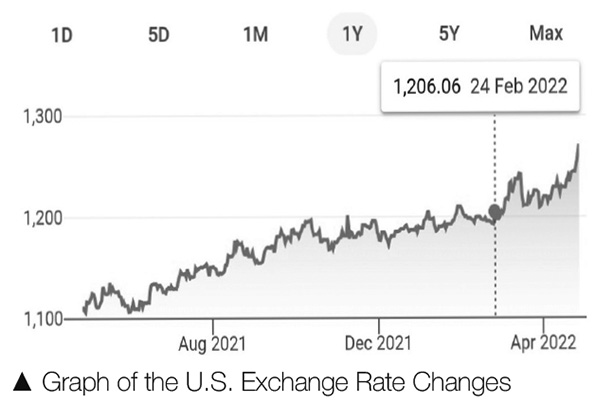On February 24, 2022, Russian President Vladimir Putin ordered a special military operation, and Russia invaded Ukraine. This incursion has been unexpectedly prolonged, with numerous casualties and refugees, and it is fair to say that Ukrainians have suffered beyond imagination. In addition, it is affecting the whole world in terms of its economy, culture, transportation, etc. Among these, the global economy suffered the most immediate impact, and it has become increasingly volatile in response to the continuing war.
Just two years ago, in 2020, many articles expressed concern about the economic situation due to negative oil prices. However, after the Russian invasion of Ukraine, international oil prices have surpassed $100 a barrel for the first time in eight years as economic sanctions were applied to Russia. In addition, natural gas prices on the European Stock Exchange hit an all-time high of $2,289 per barrel and rose by $100 in 30 minutes. On March 7, 2022, it exceeded $3,700. Moreover, it is predicted that the supply of semiconductors will become insufficient worldwide, because Russia accounts for 40% of the global production of palladium, and Ukraine accounts for 70% of the production of neon. These are necessary raw materials used to produce semiconductors.
There has also been a big fluctuation in the exchange rate. The dollar exceeded 1,200 KRW as people prefer stable investments due to war fears. It fell for a while but rose again to 1,210 KRW due to the Russian occupation of a Ukrainian nuclear power plant on March 4. In particular, companies that import a lot of raw materials were hit hard by the rise in the exchange rate, and the world was affected because the rise in the exchange rate led to inflation. In addition, world gold prices have recently reached their highest level since August 2020.
Regarding this economic situation, a professor Koo Young-wan,Dept. of Economics professor at Chungbuk National University, said, “The global supply chain has already been severely disrupted by COVID-19. Therefore, each country is implementing ‘tapering,’ which is a strategy to gradually reduce the amount of money released before raising interest rates. This practice is employed to diminish adverse side effects on the economy. It means that there’s already inflation, an economic phenomenon in which prices continue to rise due to the falling value of money, and interest rates have risen. The prolonged epidemic put unprecedented strain on world economics, and the Russian invasion of Ukraine occurred in short succession. Russia is the world’s second-largest oil-producing country and No. 1 gas exporter, and Ukraine is a European breadbasket. The war caused a ‘surge’ in basic prices and fueled inflation, and it will only worsen as this is expected to be a long-term war. Korea’s economic growth rate is expected to decline this year, and inflation is likely to rise. Unfortunately, the same can be said for other countries. If the war accelerates and prolongs, it is likely to lead to ‘stagflation (stagnation+inflation),’ which is even more difficult to escape. I hope the war will end soon, and that interest rates will rise and grow under stable inflation.”
The U.S. applied an FDPR to Russia. FDPR stands for ‘Foreign Direct Product Rule,’ which is a regulation of the U.S. Department of Commerce, which considers products produced by other countries using U.S. technology or software as the U.S. products, and requires the U.S. permission to export these to Russia.
Professor Yoon Sung-wook, from Dept. of Political Science and International Relations at Chungbuk National University, commented, “It can be said that the U.S. applied the FDPR to Russia as a means of sanctions. Considering the importance of computers and information technology, including semiconductors, and the number of items using these technologies, it seems that the U.S. has calculated that the FDPR could hit Russia significantly.” Also, the U.S. has previously applied an FDPR to the Huawei Corporation which is a big player in the Chinese economy. In response, professor Yoon said, “The difference between then and now is that there is an exemption rule this time. Many countries, especially those that trade a lot with Russia, are also concerned about the damage caused by the FDPR even if they are included in the exemption list.”
Many are quickly losing interest in the war in Ukraine, and it features less in the news as time passes. Even so, the consequences of the war will be felt locally and abroad for a long time to come. Countries seem to be far apart, but they have a huge influence on each other. Therefore, it is important to pay attention to the problems of other countries.
By Seok Yeon-ji l duswl1102@cbnu.ac.kr


 All
All Society & Global
Society & Global






 Seok Yeon-ji
Seok Yeon-ji











